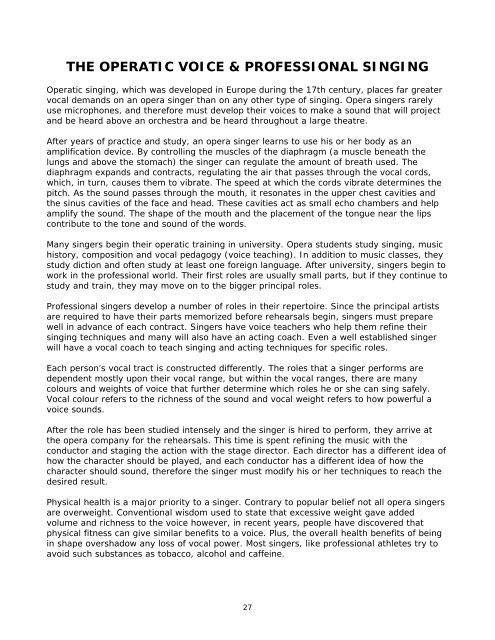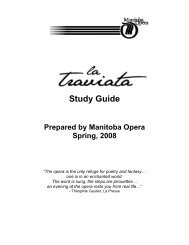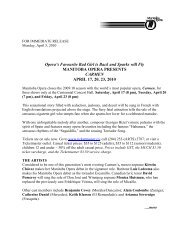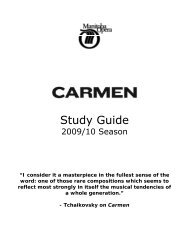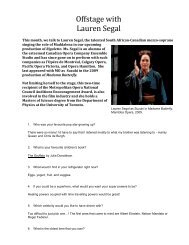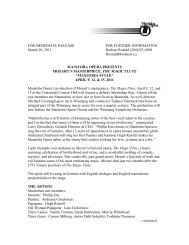The Barber of Seville Study Guide - Manitoba Opera
The Barber of Seville Study Guide - Manitoba Opera
The Barber of Seville Study Guide - Manitoba Opera
You also want an ePaper? Increase the reach of your titles
YUMPU automatically turns print PDFs into web optimized ePapers that Google loves.
THE OPERATIC VOICE & PROFESSIONAL SINGING<br />
<strong>Opera</strong>tic singing, which was developed in Europe during the 17th century, places far greater<br />
vocal demands on an opera singer than on any other type <strong>of</strong> singing. <strong>Opera</strong> singers rarely<br />
use microphones, and therefore must develop their voices to make a sound that will project<br />
and be heard above an orchestra and be heard throughout a large theatre.<br />
After years <strong>of</strong> practice and study, an opera singer learns to use his or her body as an<br />
amplification device. By controlling the muscles <strong>of</strong> the diaphragm (a muscle beneath the<br />
lungs and above the stomach) the singer can regulate the amount <strong>of</strong> breath used. <strong>The</strong><br />
diaphragm expands and contracts, regulating the air that passes through the vocal cords,<br />
which, in turn, causes them to vibrate. <strong>The</strong> speed at which the cords vibrate determines the<br />
pitch. As the sound passes through the mouth, it resonates in the upper chest cavities and<br />
the sinus cavities <strong>of</strong> the face and head. <strong>The</strong>se cavities act as small echo chambers and help<br />
amplify the sound. <strong>The</strong> shape <strong>of</strong> the mouth and the placement <strong>of</strong> the tongue near the lips<br />
contribute to the tone and sound <strong>of</strong> the words.<br />
Many singers begin their operatic training in university. <strong>Opera</strong> students study singing, music<br />
history, composition and vocal pedagogy (voice teaching). In addition to music classes, they<br />
study diction and <strong>of</strong>ten study at least one foreign language. After university, singers begin to<br />
work in the pr<strong>of</strong>essional world. <strong>The</strong>ir first roles are usually small parts, but if they continue to<br />
study and train, they may move on to the bigger principal roles.<br />
Pr<strong>of</strong>essional singers develop a number <strong>of</strong> roles in their repertoire. Since the principal artists<br />
are required to have their parts memorized before rehearsals begin, singers must prepare<br />
well in advance <strong>of</strong> each contract. Singers have voice teachers who help them refine their<br />
singing techniques and many will also have an acting coach. Even a well established singer<br />
will have a vocal coach to teach singing and acting techniques for specific roles.<br />
Each person’s vocal tract is constructed differently. <strong>The</strong> roles that a singer performs are<br />
dependent mostly upon their vocal range, but within the vocal ranges, there are many<br />
colours and weights <strong>of</strong> voice that further determine which roles he or she can sing safely.<br />
Vocal colour refers to the richness <strong>of</strong> the sound and vocal weight refers to how powerful a<br />
voice sounds.<br />
After the role has been studied intensely and the singer is hired to perform, they arrive at<br />
the opera company for the rehearsals. This time is spent refining the music with the<br />
conductor and staging the action with the stage director. Each director has a different idea <strong>of</strong><br />
how the character should be played, and each conductor has a different idea <strong>of</strong> how the<br />
character should sound, therefore the singer must modify his or her techniques to reach the<br />
desired result.<br />
Physical health is a major priority to a singer. Contrary to popular belief not all opera singers<br />
are overweight. Conventional wisdom used to state that excessive weight gave added<br />
volume and richness to the voice however, in recent years, people have discovered that<br />
physical fitness can give similar benefits to a voice. Plus, the overall health benefits <strong>of</strong> being<br />
in shape overshadow any loss <strong>of</strong> vocal power. Most singers, like pr<strong>of</strong>essional athletes try to<br />
avoid such substances as tobacco, alcohol and caffeine.<br />
27


